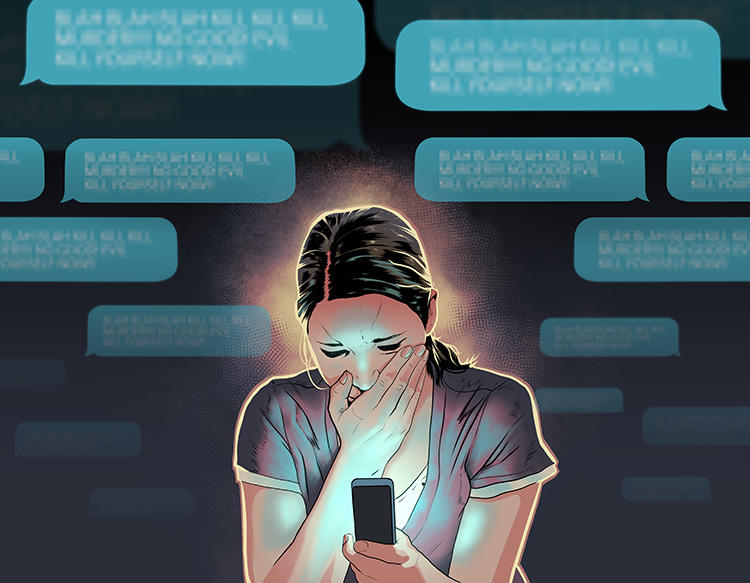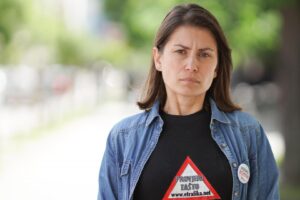
Foto: CPJ
Verbal threats, physical attacks, political pressure, death threats, defamation, denial of access to information – these are just some of the problems faced by journalists in Bosnia and Herzegovina. Since the beginning of this year, 12 cases of attacks on journalists in BiH have been recorded. Online violence and threats have become commonplace for Bosnian journalists.
After posting a photo with two migrants, Vanja Stokić, editor-in-chief of E-trafika news portal, received a message on her Facebook profile from a person named Goran Živanović, in which he threatened to “cut off the heads” not only of migrants, but also of all to the caregivers who welcome them. ” Stokić tried to immediately report the threats to the police, but was told to return on Monday – three days after the threats were made to her. Živanović contacted the editor-in-chief of E – trafika news portal again, repeating the threats and leaving his phone number so she could pass it on to the police. But that was not the end of the threats, they were accompanied by harassment not only of her but also of her friends via social media. After the unfortunate events, the Banja Luka police arrested Živanović, who was released after the interrogation, and the case was handed over to the Banja Luka District Prosecutor’s Office for further proceedings.
Inspector Mirković was punished by a 10 percent salary reduction because “he did not act upon the said report, he did not come to the injured party Vanja Stokić to file a report and take a statement from her as a witness – the injured party, nor did he inform the duty prosecutor about the said event.” The explanation further states that Mirković thus committed a minor breach of duty. The prosecutor of the Banja Luka District Public Prosecutor’s Office, Tatjana Ninković, has suspended the investigation against Goran Živanović, who threatened to kill the editor-in-chief of eTrafika portal, Vanja Stokić.
The only right thing to do is to punish Živanović, everything else sends the message that the death threats are acceptable

Stokić says that the decision on punishment was a positive surprise, especially because she did not file any charges against the inspector.
“I don’t know if anyone else did that, but if the Ministry of the Interior decided to sanction its employee for an omission, I welcome that move. On the other hand, the prosecutor’s decision was somewhat expected, but still shameful. She interpreted the message in which an unknown man threatened to cut off my head as an expression of personal attitude and dissatisfaction. She also claimed that he did not spread hate speech, which is not true. By deciding not to conduct an investigation, she made it clear that threats and hate speech are perfectly fine, because you will not be sanctioned for them. At least if you threaten journalists, if you direct your anger at institutions or politicians, you will be prosecuted immediately. ”
The Association of BH Journalists, within which the Free Media Help Line operates, hired a lawyer to file an appeal against this decision.
“When this happened, a system of support was created around me in such an extent that I really did not expect and I am infinitely grateful to the people who stood by me. Now, to surrender and just let the case go are not the options. I primarily owe that to my colleagues who, unfortunately, might one day be in my place, ” said Stokić.
Stokić believes that the only right thing to do is to punish Živanović, because everything else sends the message that the threats are okay and that no one will sanction you if you want to “behead” someone.” If the institutions react now, every next case will be easier to solve because we will have good practice that will guide us,” Stokić concludes.
Potrebno popuniti rupe u zakonima koje onemogućavaju rad novinara/ki i medije
It is necessary to fill the gaps in the laws that prevent the work of journalists and the media
Adin Šabić, editor of the Interview.ba portal comments for our platform that statistics show the best how safe journalists in BiH are.
 “It is unfortunate that at the levels of the state, entities and Brčko District, there is no adequate mechanism for the protection of journalists. Although the House of Representatives of the Federation of BiH supported the initiative to amend the Criminal Code of the Federation of BiH, which would treat attacks on journalists as an attack on officials, it has not yet taken root. In Republika Srpska, the draft with the amendments to the Criminal Code has been sent to the parliamentary procedure and is waiting for better days when MPs will consider it, and until then, attacks on journalists will be treated as an attack on an ordinary citizen, even though they are doing business that is much more exposed to attacks “, states Šabić.
“It is unfortunate that at the levels of the state, entities and Brčko District, there is no adequate mechanism for the protection of journalists. Although the House of Representatives of the Federation of BiH supported the initiative to amend the Criminal Code of the Federation of BiH, which would treat attacks on journalists as an attack on officials, it has not yet taken root. In Republika Srpska, the draft with the amendments to the Criminal Code has been sent to the parliamentary procedure and is waiting for better days when MPs will consider it, and until then, attacks on journalists will be treated as an attack on an ordinary citizen, even though they are doing business that is much more exposed to attacks “, states Šabić.
When asked what needs to be done in order to protect journalists in BiH, Šabić emphasized that it is necessary to fill the gaps in the laws that prevent the work of journalists and the media in general. “If the initiatives were adopted to change the criminal laws, which say that an attack on a journalist is treated as an attack on an official, given the increased sanctions that result from that, I think we would get a smaller number of attacks. “
Responsibility lies with the state authorities
Mehmed Halilović, legal advisor for the media, believes that the responsibility in this case lies with the state authorities, primarily the police and the prosecution.

“I am surprised, but at the same time upset by the reaction of the police, because in some other cases when they were sent anonymously, not to mention even harmless threats to politicians, they reacted much faster and more efficiently. But when it comes to journalists, that was not the case, as is the case with Vanja Stokić.” He added that he was both surprised and upset by the poor reaction of the prosecution.
“Such a threat must be taken seriously because an attack on any person, journalists in particular, is an attack on all citizens, and I think that in this particular case, the prosecution was below any level appropriate for a democratic society,” Halilović said.
Halilović emphasized that it is necessary to react more efficiently and faster, and that direct procedures and reactions must be taken:
“The prosecution had to file an indictment, and the attacker had to be prosecuted and sanctioned, to act preventively in the future because sanctions for criminal acts, among other things, have not only mandatory sanctioning of perpetrators, but also a preventive role to prevent future crimes.”
Cooperation between the academic and professional community is necessary
Lamija Silajdžić, senior assistant at the Faculty of Political Science, University of Sarajevo, states that the Department of Communication studies the rights of journalists through the subjects of Media Regulation and Ethics of Public Speech, where students learn about relevant international and domestic legal solutions and journalistic codes that deal with this area.

“However, it is necessary to conduct continuous research, because attacks on journalists do not stop and they pose a threat to free and professional journalism. Cooperation between the academic and professional community is necessary in this context, in order to provide students with both theoretical and practical insight into ways to protect journalists from the attacks and violence. “